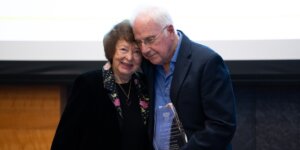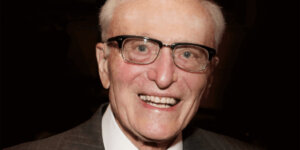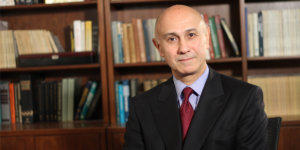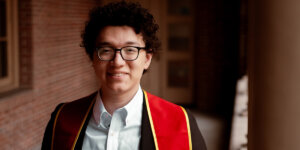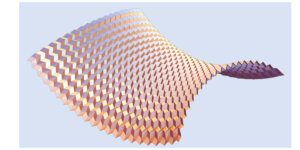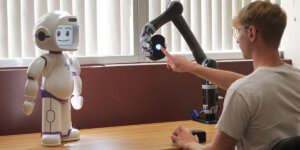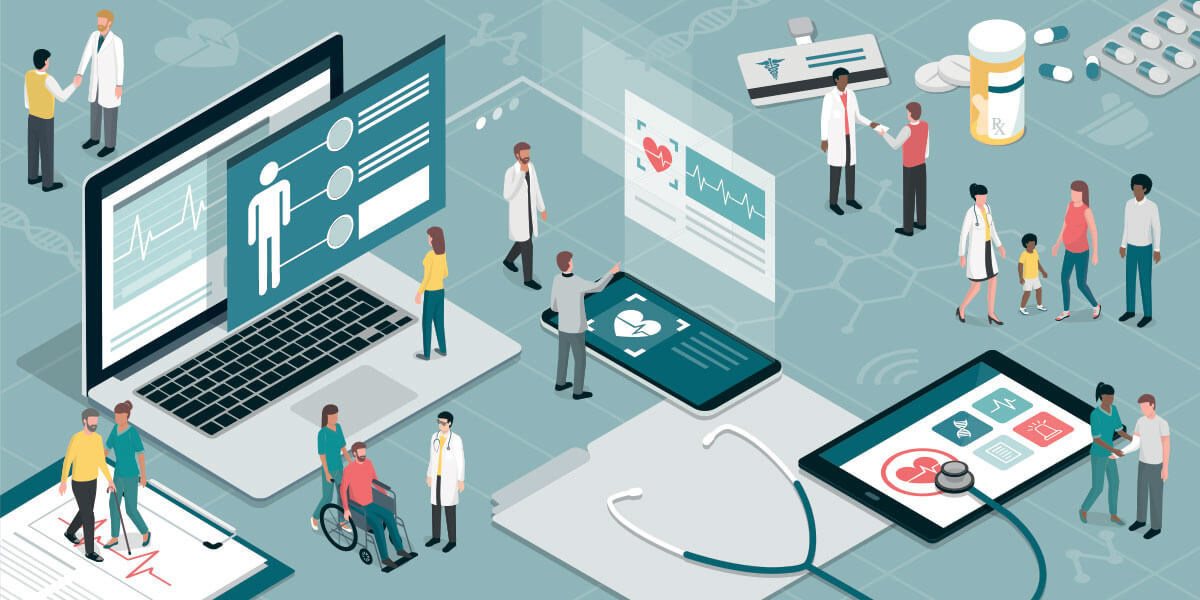
Illustration/iStock
Patients at Harbor-UCLA Medical Center have access to an online portal that allows them to make appointments, obtain lab results, refill prescriptions and even send notes to their doctors and nurses.
The MyWellness portal is great way for patients to access important information. However, medical center officials want to make it even better. For the 600,000-plus Southern Californians who have access to the portal as patients at Harbor-UCLA and the three other Los Angeles County Department of Health Services-affiliated hospitals and 18 affiliated medical clinics, such an upgrade would allow them to further streamline and improve their healthcare.
Mary Bessell, a second-year USC Viterbi progressive degree candidate, hopes to change that for the benefit of the LA County Department of Health Services’ low-income, vulnerable, and often immigrant patient populations.
Project SUNRISE
As a participant in Project SUNRISE, or Students Uniting for Real Impact to Society through Engineering – a new USC Viterbi School of Engineering sponsored program that promotes humanitarian engineering and aims to teach engineering and other students to leverage technology and entrepreneurship to address real-world healthcare problems, particularly in underserved communities – Bessell and her teammate, Gauri Madhok, a computer science and business administration student, want to help make the MyWellness portal more accessible, informative, and widely used.
Ideas under consideration include replacing dropdown menus with “more obvious and user friendly” sidebars; making it easier to open links by requiring one instead of two clicks; and, in the long-term, producing a health education video about diabetes and diabetes management to upload to the MyWellness portal.
“I want to have an opportunity to apply engineering to help people,” said Bessell, who hopes to design medical devices after graduating with a master’s degree in product development engineering. “I want to get a better understanding of how I can apply all the theory that I’ve learned in my courses to an industry-related project.”
Project SUNRISE has given her and the 15 other student participants the chance to do just that.
Launched last fall, Project SUNRISE helps participating USC undergraduate and graduate students produce a prototype, digital solution, such as software, or even an innovative idea that addresses an important preventative healthcare challenge. Ideas suggested by project partner LA County DHS include encouraging qualified MediCal patients to engage with their primary care providers and clinics; improving colon cancer screening rates among African-American men; increasing cervical cancer screenings, or PAP smears; and improving the MyWellness portal to inspire engagement and patient enrollment.
Project SUNRISE is a unique interdisciplinary combination of lean startup methods, best practices in social entrepreneurship, and professional approaches to generating resources. Over the course of the 2018-2019 academic year, SUNRISE students attended workshops about customer discovery, co-sponsored by the National Science Foundation I-Corps program, as well as social entrepreneurship, in partnership with the Brittingham Social Enterprise Lab in the USC Marshall School of Business.
Additionally, student proposals for funding were reviewed by students in a course on grant writing in the USC Sol Price School of Public Policy, taught by Professor Alexandra Graddy-Reed. During the problem discovery process, SUNRISE students met with physicians and nurses at Harbor-UCLA and with nonprofit leaders at the LAC+USC Wellness Center in Los Angeles to learn about their frustrations and discuss possible solutions, identified projects they planned to pursue, then applied for and received grants from the USC Viterbi Technology, Innovation and Entrepreneurship office to support additional problem discovery.
“The purpose of Project SUNRISE is to give our engineering students and others in the university a chance to come up with solutions for some real-world problems,” said Trina Gregory, project leader and a USC Viterbi senior lecturer. “It’s a way for them to go out there, do some customer discovery, and try to develop some ideas that could help our local community.”
On April 24, Project SUNRISE participants will display their prototypes, business models and software at a public showcase. The strongest teams, Gregory added, could be encouraged to participate in next year’s Maseeh Entrepreneurship Prize Competition, or MEPC, one of the premier business model competitions for USC Viterbi and students, faculty and would-be business builders.
Project SUNRISE, Gregory said, should continue for years to come. However, the topics will change, although students will always address real-world challenges to vulnerable members of society. Next year’s Project SUNRISE will address the two areas of interest to the next National Academy of Engineering Global Grand Challenges Summit: artificial intelligence (AI) for social good and sustainability.
Helping Through Social Entrepreneurship
Dr. Anshu Abhat, director of digital patient engagement at the Los Angeles Department of Health Services, said she’s excited about collaborating with USC Viterbi students, given their strong technological backgrounds.
“We’ve mostly worked in the past with administration students, but, until now, we really haven’t had any engineering students,” said Abhat, also an assistant professor at the David Geffen School of Medicine at UCLA. “I think there’s a tremendous opportunity here.”
On a personal level, Abhat – who is based at Harbor-UCLA – hopes the exposure to people in need could influence Project SUNRISE participants’ career decisions. “I hope this experience makes them [engineering students] more connected to their communities, wherever they are, and they might consider adding a social justice component to their future work, whether medical or not.”
For years, Adam Walker, a Project SUNRISE student, has more or less done just that.
A senior majoring in biomedical engineering, he belonged to the four-member INTRAM team that the National Academy of Engineering selected as one of the 15 finalists at the 2017 International Student Day Business Model Competition in Washington D.C. INTRAM created a mobile app to help patients having a stroke receive the best possible medical care in the shortest among of time.
Now, Walker, Manjima Sakar – a BME senior and fellow INTRAM cofounder – and Calvin Le, a senior studying biology with a business minor, have joined forces to leverage technology for the greater good.
They envision a database that would give physicians access to easy-to-understand translations of complex medical conditions, such as diabetes, into Korean, Spanish and other languages. Such a tool would allow doctors to communicate clearly, accurately and effectively with immigrant LA County DHS patients about their medical conditions.
Walker said he sees lots of value in Project SUNRISE.
“Programs like this lower the barrier to entry of becoming an entrepreneur,” he said, “and show that as an engineering students you can do more than simply write papers and build devices.”
Published on April 8th, 2019
Last updated on June 17th, 2025




